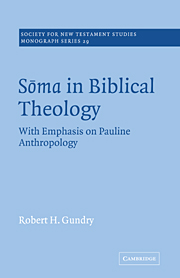Book contents
- Frontmatter
- Contents
- Acknowledgements
- Abbreviations
- PART I FOR AND AGAINST A HOLISTIC DEFINITION OF SŌMA
- PART II SŌMA IN THE FRAMEWORK OF ANTHROPOLOGICAL DUALITY
- 8 Anthropological duality and classical Greek thought
- 9 Anthropological duality in the Judaism of NT times
- 10 Anthropological duality in the NT outside Pauline literature
- 11 Anthropological duality in the OT
- 12 Anthropological duality in Pauline literature
- PART III THE THEOLOGY OF SŌMA AS PHYSICAL BODY
- Select bibliography
- Index of passages cited
- Index of authors
8 - Anthropological duality and classical Greek thought
Published online by Cambridge University Press: 14 January 2010
- Frontmatter
- Contents
- Acknowledgements
- Abbreviations
- PART I FOR AND AGAINST A HOLISTIC DEFINITION OF SŌMA
- PART II SŌMA IN THE FRAMEWORK OF ANTHROPOLOGICAL DUALITY
- 8 Anthropological duality and classical Greek thought
- 9 Anthropological duality in the Judaism of NT times
- 10 Anthropological duality in the NT outside Pauline literature
- 11 Anthropological duality in the OT
- 12 Anthropological duality in Pauline literature
- PART III THE THEOLOGY OF SŌMA AS PHYSICAL BODY
- Select bibliography
- Index of passages cited
- Index of authors
Summary
If Paul never uses sōma as a technical term for the whole person but always of man's physique, the possibility of a certain anthropological dualism arises. In fact, the strictly physical meaning of sōma demands qualification of the unitary view of man. (We may presume that Paul's use of terms for the incorporeal side of man prohibits thorough-going materialism.) For reasons yet to be explored, however, it will appear that ‘dualism’ too strongly dichotomizes Pauline anthropology. And the traditional term ‘dichotomy’, being purely ontological in its connotation, lacks dynamism. ‘Duality’ – just because it sounds like a hybrid of ‘dual’ and ‘unity’ and poses the possibility of a functional as well as ontological understanding – better expresses Paul's way of thinking. Even then careful explanation must accompany the term.
For the avoidance of misunderstanding we need to issue a number of disclaimers even prior to discussion of the evidence in favor of anthropological duality. There is no making of Paul into a Greek. The distance of Paul from Philo, who attempted to combine Jewish theology and Hellenistic philosophy, clearly shows the comparatively un-Hellenistic character of Pauline anthropology. Rather, the Hebrew concept of man was not monadic even though it was unitary. The anthropological duality of the OT, yet to be considered here, developed clearer exposition in Judaism of the Hellenistic age but usually resisted a dualism in which body and soul oppose each other.
- Type
- Chapter
- Information
- Soma in Biblical TheologyWith Emphasis on Pauline Anthropology, pp. 83 - 86Publisher: Cambridge University PressPrint publication year: 1976



